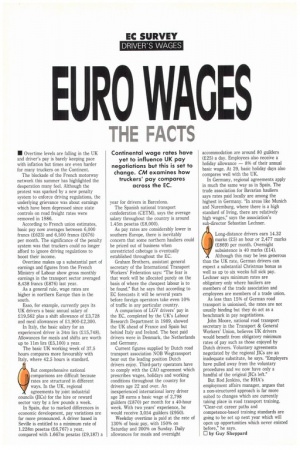EUR.p iE l C I T CES Continental wage rates have yet to influence UK pay
Page 38

If you've noticed an error in this article please click here to report it so we can fix it.
negotiations but this is set to change. CM examines how truckers' pay compares across the EC.
• Overtime levels are falling in the UK and driver's pay is barely keeping pace with inflation but times are even harder for many truckers on the Continent.
The blockade of the French motorway network this summer has highlighted the desperation many feel. Although the protest was sparked by a new penalty system to enforce driving regulations, the underlying grievance was about earnings which have been depressed since state controls on road freight rates were removed in 1986.
According to French union estimates, basic pay now averages between 6,000 francs (£623) and 6,500 francs (£676) per month. The significance of the penalty system was that truckers could no longer afford to ignore driving regulations to boost their income.
Overtime makes up a substantial part of earnings and figures from the French Ministry of Labour show gross monthly earnings in the transport sector averaged 8,438 francs (£876) last year.
As a general rule, wage rates are higher in northern Europe than in the south.
Esso, for example, currently pays its UK drivers a basic annual salary of £.19,562 plus a shift allowance of £3,728 and meal allowances of £1,900-£2,300.
In Italy, the basic salary for an experienced driver is 34m lira (£.15,748). Allowances for meals and shifts are worth up to 11m lira (£5,100) a year.
The basic UK working week of 37.5 hours compares more favourably with Italy, where 42.5 hours is standard.
4 But comprehensive national comparisons are difficult because rates are structured in different ways. In the UK, regional agreements by joint industrial councils (JICs) for the hire or reward sector vary by a few pounds a week.
In Spain, due to marked differences in economic development, pay variations are far more pronounced. A driver based in Seville is entitled to a minimum rate of 1.228m pesetas (£6,767) a year, compared with 1.667m pesatas (£9,187) a year for drivers in Barcelona.
The Spanish national transport confederation (CETM), says the average salary throughout the country is around 1.45m pesetas (£8,000).
As pay rates are considerably lower in southern Europe, there is inevitably concern that some northern hauliers could be priced out of business when unrestricted cabotage is eventually established throughout the EC.
Graham Brothers, assistant general secretary of the International Transport Workers' Federation says: "The fear is that work will be allocated purely on the basis of where the cheapest labour is to be found." But he says that according to EC forecasts it will be several years before foreign operators take even 10% of traffic in any particular country.
A comparison of LGV drivers' pay in the EC, completed by the UK's Labour Research Department in 1989, showed the UK ahead of France and Spain but behind Italy and Ireland. The best paid drivers were in Denmark, the Netherlands and Germany.
Current figures supplied by Dutch road transport association NOB Wegtransport bear out the leading position Dutch drivers enjoy. Third-party operators have to comply with the CAO agreement which prescribes wages, holidays and working conditions throughout the country for drivers age 22 and over. An inexperienced international lorry driver age 28 earns a basic wage of 2,798 guilders (£870) per month for a 40-hour week, With two years' experience, he would receive 3,054 guilders (£950).
Weekday overtime is paid at the rate of 130% of basic pay, with 150% on Saturday and 200% on Sunday. Daily allowances for meals and overnight accommodation are around 80 guilders (£25) a day. Employees also receive a holiday allowance — 8% of their annual basic wage. At 29, basic holiday days also compares well with the UK.
In Germany, regional agreements apply in much the same way as in Spain. The trade association for Bavarian hauliers says rates paid locally are among the highest in Germany. "In areas like Munich and Nuremburg, where there is a high standard of living, there are relatively high wages," says the association's sub-director Sebastian Lechner.
4 Long-distance drivers earn 14.32 marks (£5) an hour or 2,477 marks (£869) per month. Overnight subsistence is 40 marks (£14). Although this may be less generous than the UK rate, German drivers can expect a substantial Christmas bonus as well as up to six weeks full sick pay. Lechner says minimum rates are obligatory only where hauliers are members of the trade association and employees are members of a trade union.
As less than 15% of German road transport is unionised, the rates are not usually binding but they do act as a benchmark in pay negotiations.
John Moore, national road transport secretary in the Transport & General Workers' Union, believes UK drivers would benefit from obligatory minimum rates of pay such as those enjoyed by Dutch drivers. Voluntary agreements negotiated by the regional JICs are an inadequate substitute, he says. "Employers have pulled away from the voluntary procedures and we now have only a handful of the original JICs left."
But Rod Jenkins, the RHA's employment affairs manager, argues that a non-structured approach is far more suited to changes which are currently taking place in road transport training. "Clear-cut career paths and competence-based training standards are going to be set up next year which will open up opportunities which never existed before," he says.
0 by Guy Sheppard












































































